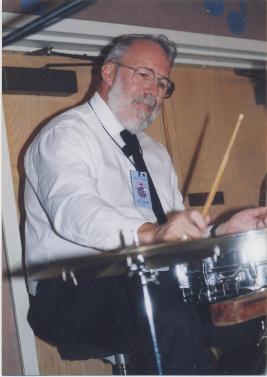CD Review
by Bert Thompson
THE HAPPY PALS WITH Dr. Michael White—"Moonlight Bay" THE SIXTH
ANNUAL KID BASTIEN FOREVER KICK-ASS NEW ORLEANS JAZZ PARTY
(New Orleans North CD-010). Playing time: 68 mins. 40 secs.
Je Vous Aime; Everybody Loves Saturday Nightº*; I’ll Never Smile Again†; Big Chief
Battleaxe; Riverside Blues; Dinah†; Moonlight Bay‡; Royal Telephoneº*; Last Train
to San Fernandoº; Make Me a Pallet on Your Floorº†; You Tell Me Your Dreams;
Maori Farewell Song**; China Boy; My Happiness*.
Recorded at Grossman’s Tavern, Toronto, Canada, Feb. 9-10, 2009.
Personnel: Patrick Tevlin, trumpet, vocal*; Kid Kotowich, trombone, vocal†; Dr.
Michael White, clarinet; Toby Hughes, alto sax; Roberta Tevlin, piano; Alex Ralph,
banjo (except Rainer Hunck, banjoº, Ted Jensen Banjo‡); Tyler Thomson, string
bass; Chuck Clarke, drums, vocal**.
This recording documents part of last year’s “Kid Bastien Forever Kick-Ass New
Orleans Jazz Party” at Grossman’s Tavern in Toronto, Feb. 6-7, 2009: a memorial to
Kid Bastien and a harbinger of Mardi Gras which would follow. Joining the Happy
Pals is Dr. Michael White from New Orleans on clarinet. (Although he is not a
physician, he apparently favors the title as it always seems to be given wherever and
whenever his name is mentioned.)
White is that relative rarity today—a black musician playing traditional jazz. He
began his musical endeavors by studying classical clarinet and, after teaching
Spanish for some twenty years, switched to teaching African-American music at
Xavier University of Louisiana. His home in New Orleans was destroyed in the
flooding during Katrina, resulting in his losing many musical treasures, including
the original sheet music of Dead Man Blues by Jelly Roll Morton, which he had
owned, as well as a clarinet mouthpiece of Sidney Bechet, and his collection of some
5,000 records and LPs, among other jazz artifacts. Since 1981 he has led his Original
Liberty Jazz Band in New Orleans, as well as the Liberty Brass Band and a quartet,
and has recorded a dozen or so albums under his own name. In an admirable
attempt to keep the tradition going, he has composed a number of tunes in the New
Orleans jazz style, although none are featured on this CD.
White was apparently inspired to take up clarinet by hearing George Lewis play,
and one hears Dodds, Bechet, Noone, Hall, Bigard, Simeon mentioned as having
some influence, but I can’t say I detect much of it in his playing. Undoubtedly he
strives to be himself—not a bad thing in any musician. His tone, however, is a bit
thin and solos less than memorable to my ears. I was more impressed with his
fellow reedman on this CD, Hughes on sax. Perhaps he was a more relaxed since he
was playing in familiar surroundings, as opposed to White.
As anyone who is familiar with the Happy Pals will discover, they are in typical
form here, showing the influences of the Kid Thomas band we have come to
expect. Patrick Tevlin provides his usual commanding lead, playing muted trumpet
on many of the numbers and showing the customary Thomas flourishes, growls,
slurs, and attack. Completing the front line is Kotowich on trombone, providing
just the right counterpoint. Chuck Clarke plays tasteful drums and keeps a good
grip of tempos, and although he includes some of Sammy Penn’s licks, he is not as
intrusive as Penn so often was. (Yes, I’ve taken a bit of stick for this opinion, but I
still hold it). The rest of the rhythm section, regardless of who is playing banjo, is
quite solid throughout, Thomson playing propulsive bass and Roberta Tevlin the
right chords on piano.
I prefer a live performance recording, despite any shortcomings such can have. This
one provides hot jazz of the New Orleans variety, and even when a train wreck is
narrowly averted, as it is on the ending of Riverside Blues, hearing how it is rescued
(by Tevlin) is all part of the jazz experience. There are no stars here—just congenial
musicians having a great time and happily sharing it with the audience. All of the
numbers on the tune list are from the pre-swing era, excepting Last Train from San
Fernando ( a new one to me that neatly exhibits Jelly’s Spanish tinge), and they
provide a nice mixture of the familiar and less familiar. Maori Farewell Song is
better known, perhaps, as Now Is the Hour (When We Must Say Goodbye).
It is fitting that the Happy Pals should end this CD with a tune with “happiness” in
its title. This is the prevailing emotion of the entire event, and through this CD we
have a chance to share it. As you can tell, I thoroughly enjoyed this romp and, if
you dig uptown New Orleans style, you will too.
Like the group’s last CD, “WILLIE THE WEEPER” (New Orleans North CD-008),
this is issued in the simple sleeve format, with the addition this time of some brief
notes by Patrick Tevlin inserted. Lagniappe for those whose playback equipment
displays track titles is that this CD has that data embedded. Ordering information
can be obtained from the band’s web site at www.HappyPals.ca.
|
|


